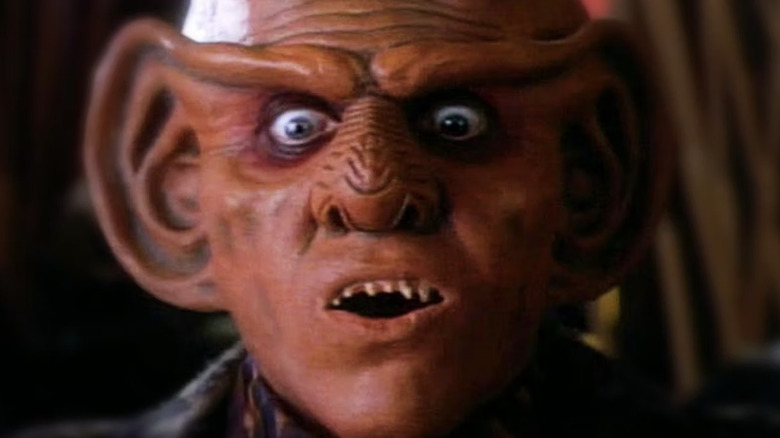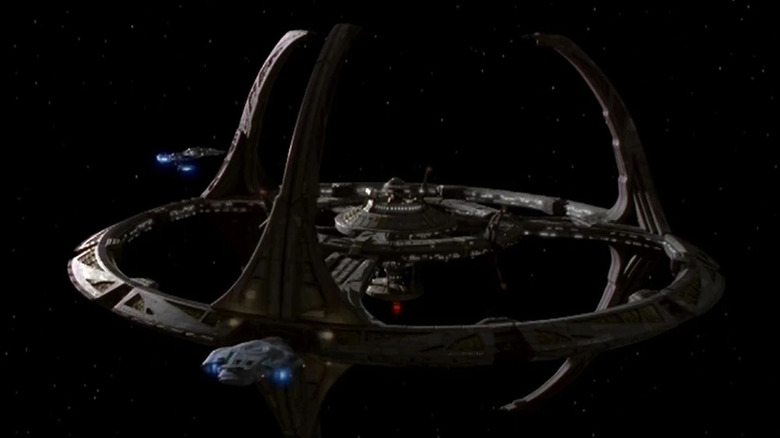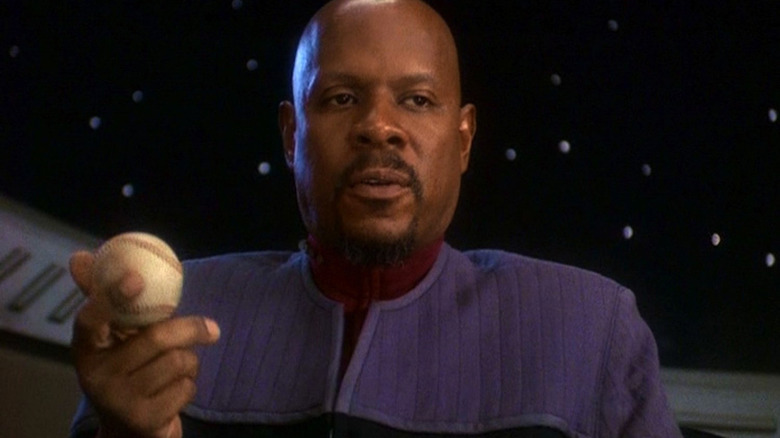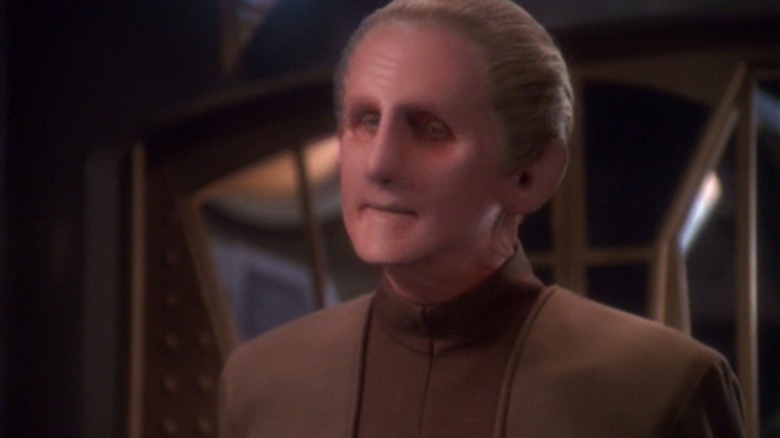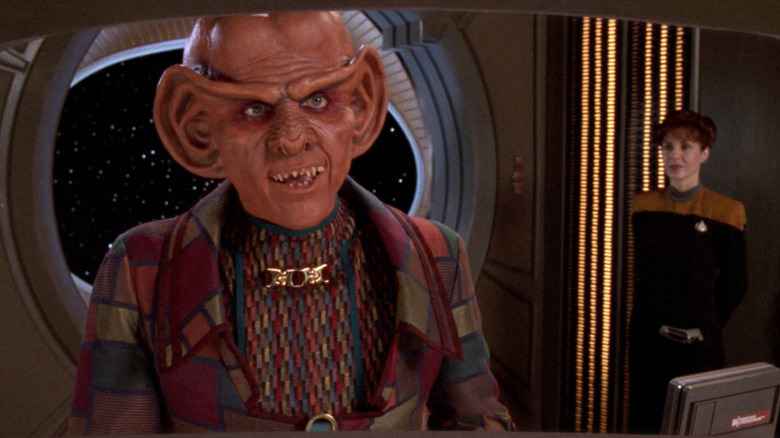The Death Of Star Trek's Gene Roddenberry Sparked An Eternal Deep Space Nine Debate
"Star Trek" creator Gene Roddenberry died on October 24, 1991, at the age of 70. It was pretty widely known that Roddenberry widely used cocaine, quaaludes, methamphetamines, and a variety of other recreational drugs, a fact discussed tastefully and frankly in Joel Engel's 1994 biography "Gene Roddenberry: The Myth and the Man Behind Star Trek." Roddenberry's health suffered as a result of his drug use, and his body was dealt a major blow in 1989 when he suffered a stroke. He was still working on "Star Trek: The Next Generation" at the time but had to take a step back in the show's third season for health reasons.
The show continued until 1994, and Roddenberry — already famous for creating "Star Trek" in 1966 — lived long enough to see his legacy cemented in a new decade. "NextGen" represented a "purer" version of Roddenberry's vision as presented back in 1966. This one was his baby.
Near the end of Roddenberry's life, producer Rick Berman claimed that he had approached Gene about another potential Trek spinoff and that he seemed distantly amenable to the idea. Sadly, he was sickly at the time, and a proper conversation could not be held. In 1993, about 18 months after Roddenberry died, Berman and Michael Piller created "Star Trek: Deep Space Nine," a series set on board a space station that took place in the same time frame as "NextGen."
According to the oral history book "The Fifty-Year Mission: The Next 25 Years: From The Next Generation to J. J. Abrams," edited by Marc A. Altman and Edward Gross, "Deep Space Nine" kicked off a long-form debate about "Star Trek" that, in some circles, rages on to this day. Namely: how much of Roddenberry's utopian vision made its way onto "Deep Space Nine?"
Gene would have hated it
It seems that Berman and Roddenberry did get to talk about "Deep Space Nine" at least a little bit, as it became a matter of record that Roddenberry hated the idea. Note immediately that the show is called "Star Trek," not "Star Stay in One Place." According to actress Marina Sirtis from "Next Generation," Roddenberry was explicit. She said:
"The truth is that if Gene was alive, 'DS9' would have never been made, because he absolutely said no to it when it was presented to him. He said 'Star Trek' is about exploring space, it's not about a hotel in space. So it would never have happened."
Rod Roddenberry, Gene's son, admitted that he never really got into "Deep Space Nine," even though he admired what Berman and Piller had created. He liked the general Roddenberryian messages but felt that "DS9," in being so conflict-forward, resembled "Star Wars" more than "NextGen." Trek was meant to be ideal. "DS9" was about struggle and conflict. A Trek archivist defined the tonal shift perfectly for Rod, who quoted him:
"Richard Arnold said one thing that stuck with me, which was, ['Star Trek'] and, especially, 'Next Generation' had a humanity that was a better humanity. And in 'Deep Space Nine,' specifically, that was us today. They were dealing with the same sort of issues we were dealing with today, our petty issues of selfishness, and so it wasn't necessarily that intellectually evolved humanity.' Not as much as 'Next Generation' was. 'Next Generation,' we were already better than we are now. With 'Deep Space Nine,' we had taken a step back to our little petty squabbles and things like that."
"Deep Space Nine" was a sociopolitical drama that descended into war. Gene, who ached for a post-war future, may not have been happy.
'They did not hesitate'
Berman only tells amusing stories about the creation of "Deep Space Nine," recalling merrily that the head of Paramount didn't know anything about "Star Trek," so it was up to him and Piller to invent something that was pitched to them as "'The Rifleman' in space." However, Susan Sackett, Roddenberry's assistant and longtime girlfriend, recalled that the creation of "Deep Space Nine" wasn't a rosy tale. Indeed, it was a story of Berman and Piller deliberately rushing a show into production against Gene's explicit wishes. The funeral baked meats did coldly furnish forth the marriage tables. She said:
"Gene had not approved ['DS9']. He hated it and he did not want them doing it. A week after he died, they took it and ran with it, and that's not something I was happy about. 'Gene's gone, now we can do "Deep Space Nine."' They did not hesitate. Within two weeks, they got a green light on it. When he was alive, he said, 'You can't do it. I don't approve of this.' I think it was the premise and the characters. Gene had an ego, so maybe it was because he wasn't involved in creating it and felt it was too soon. I know he did not want it or like it. And they lied and said Gene approved it."
"Deep Space Nine" is deeply beloved by many Trekkies, with some saying that it might be the best of all the Trek shows. It revealed a span of the "Star Trek" universe that diplomacy hadn't reached yet and dealt with difficult issues like genocide, reconstruction, corrupt theocracies, and wounded societies. It provided a dark counterbalance to the gentle sheen and diplomatic ideals of "Next Generation." For many, this was refreshing. For Roddenberry, 'twas an error.
Berman's side of things
Berman, of course, tells a version of the story that is rosier. He claims that Roddenberry never really seemed to wholly disapprove of "Deep Space Nine," and even expressed mild enthusiasm. Berman also recalled that Gene was incredibly sick during some of their conversations and that their meetings were not terribly explicit. Berman said:
"Gene was very ill. Most of the encounters I had with him were at his home in Bel Air. I specifically remember going to sit with him and Michael in his kitchen and basically telling Gene that the studio had asked us to develop a new show and that we were working on it. I can't say he was excited about it. Nor was he in any way upset about it. He just kind of nodded and said it was really interesting and he'd love to know more."
Roddenberry may not have written off on "Deep Space Nine," but according to Berman, there was no strenuous objection as Sirtis and Sackett had asserted. Berman continued:
"It was discussed vaguely with Gene, who never seemed extremely enthusiastic nor in a way problematic with it. This was at a very early stage and he really wasn't interested. I think it maybe wasn't a question of disinterest. I think it was more a question of he was not very well at that point."
Which seems likely. It's possible Roddenberry wasn't terribly invested in "Deep Space Nine" one way or the other, focusing instead on his health and getting bed rest. Both Berman and Piller, meanwhile, were careful to explain that Roddenberry's voice was always in their ears when developing their new show. They were both producers on "Next Generation," so likely knew — or claimed to know — what Roddenberry would have approved.
Maybe he would have turned around
Piller, too, only had upbeat things to say about honoring Gene's legacy and keeping the spirit of Trek alive. In many ways, "DS9" did indeed adhere to Roddenberry's model of tackling modern social issues with sci-fi stories. What was lacking was the utopian underpinnings. Piller said:
"The philosophy of Gene Roddenberry guided us. He didn't have any exposure to the specifics of this series, but he was with us in anything having to do with 'Star Trek.' We had learned from him and from experience that stories that combine science fiction with philosophy with optimism, with a comment on social issues and an exploration of human values, are the stories that work for 'Star Trek.' Those are the stories that worked for us."
"DS9's" showrunner, Ira Steven Behr, meanwhile, said he recalled hearing a very general buzz in the early days of the show that Roddenberry would have not approved. He did, however, have utter faith in the show, and felt it was so good that even Roddenberry, if given the chance to see it, would have perhaps adored "Deep Space Nine." Or perhaps not. Behr knew how Roddenberry's retinue behaved and how closely they reflected Gene's views. Behr said:
"I've given many statements over the years saying that if he had lived, I can't believe that as the show went on he could have remained as negative about it as he might have allegedly been at the start. I'd like to think that as a creative human being, he would have come to appreciate it. But, the more stories I hear about Gene, I'm not so sure that would have happened. I know his little posse hated the show; they were not fans."
Both "TNG" and "DS9" lasted seven seasons.
